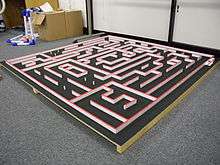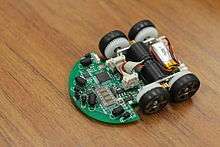Micromouse


Micromouse is an event where small robot mice solve a 16x16 maze. It began in late 1970s, although there is some indication of events in 1950. Events are held worldwide, and are most popular in the UK, U.S., Japan, Singapore, India and South Korea.
The maze is made up of a 16 by 16 grid of cells, each 180 mm square with walls 50 mm high. The mice are completely autonomous robots that must find their way from a predetermined starting position to the central area of the maze unaided. The mouse will need to keep track of where it is, discover walls as it explores, map out the maze and detect when it has reached the goal. Having reached the goal, the mouse will typically perform additional searches of the maze until it has found an optimal route from the start to the center. Once the optimal route has been found, the mouse will run that route in the shortest possible time.
Mice can run at over three meters per second, depending on the maze design. Some of the best micromouse builders are Kato-san , Ng Beng Kiat and Nakashima-san . The current world records is around 4 seconds and is held by Ng Beng Kiat.
Performance in recent years has improved considerably. As of 2015, winning mice are likely to run with forward acceleration and braking well over 10m/s/s. Cornering is possible with centripetal accelerations as high as 2g. Micromice are among the highest performing autonomous robots there are.
Mice can use various searching algorithms. Common search algorithms use variations of the Bellman Flood-fill method , Dijkstra's algorithm, A* search algorithm among various graph traversal and tree traversal algorithms.
A new version of Micromouse called the Half Size Micromouse has been introduced for 30th All Japan Micromouse Competition 2009. Instead of a 16 x 16 maze the new competition uses a 32 x 32 maze, but the same square area. Cell and wall dimensions have been reduced, providing a new challenge.
External links
- Micromouse USA | USA Micromouse Fans Site — Shared experiences, Tutorials, Wiki, Forum, Competitions, latest trend and everything for Micromouse.
- Micromouse at Birmingham City University — Host of the UK Micromouse Competition.
- UK Micromouse 2012 information from the competition held at the Birmingham TechFest.
- Micromouse Online — News, Articles and Discussion Forum for the Micromouse and small robot builder.
- Resources and inspiration for the micromouse builder
- Mobots — Micromouse building experiences
- Techfest conducted Micromouse for the first time in India
- IIT Kharagpur's Robotics Competitions — Indian Institute of Technology Kharagpur organizes Micromouse competitions regularly
- All-Japan Micromouse Contest (auto-translation from Japanese)
- Rules for 31st (2010) All-Japan Micromouse Contest
- French Micromouse Contest
- akrobotnerd.com — Learn to build and program your own Micromouse robot